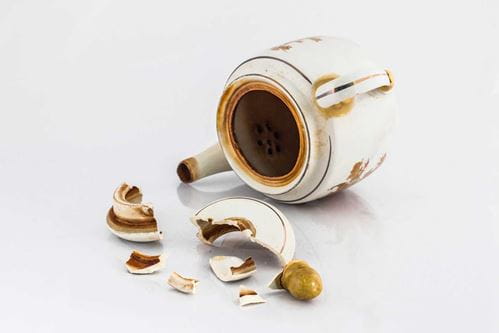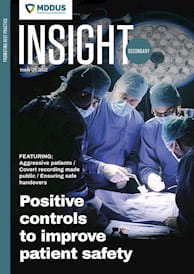
I WAS recently asked to record a video about accountability for a hospice where I am a trustee. After some thought, the inevitable ineptitude with a camera followed, but words were duly recorded and the video posted. That was relatively easy. It is, of course, in the enactment that the complexity and challenges of meaningful accountability are felt.
A few days later, I was staying in a friend’s house whilst she was away. As I picked up her teapot the lid cracked in two. I watched, horrified, as it separated in my hands.
There was no question what I had to do. First, to try to put it right. I’m as unskilled with pottery repair as I am with cameras. Research suggested a clean break could be repaired with a special adhesive; a task that might be within my reach if I could find said adhesive in the rural location in which I was staying. I had to make the effort to find the adhesive and do my best to mend the teapot.
There was, though, a more difficult task. I had to tell my friend what had happened, to be accountable and apologise. Whether I was capable of a skilful repair did not matter – even if it were invisible, being a friend and being accountable meant being honest and having a difficult conversation.
I drove to the nearest town, then onto another and further towards a third town across the countryside. In a fourth location, the owner of a specialist art shop sold me the ceramic adhesive and kindly sympathised with my predicament, sending me on my way with careful instructions and a dose of good luck.
Reader, I did my best. The two parts of the lid were reunited. It looked okay. I could still see the crack and time would tell if it held until the morning, but the lid was functional. By now, it was late and I didn’t want to ruin my friend’s evening with a clumsily expressed piece of bad news. I would take my time, think about what I needed to say and call her in the morning.
Overnight, I thought a lot about accountability.
The language we use is interesting to me. We talk of ‘holding someone to account’, which often carries hints of the punitive and externally controlled. I wondered what it is that makes it possible to develop an internal sense of accountability and what influences the ease, or otherwise, with which we step up to be accountable. I suspect that organisations expect accountability, but perhaps pay too little attention to what barriers and facilitators there are to being accountable in practice.
Donald Winnicott, the paediatrician and psychoanalyst, wrote about the ‘holding environment’, which he recognised as crucial to the healthy development of babies. It emphasises the capacity to respond to psychological as well as physical and practical needs. That seems important in the context of professional accountability too. There were practical steps I had to take to be accountable, but there was also a significant emotional dimension. I felt guilty. I love and value my friend. I worried about harming our relationship even as I recognised that trust demands we are honest with each other. I did, though, know her to be kind, generous, humane, thoughtful and forgiving. She had, over the years, created an environment and a reciprocal relationship in which I could make mistakes, be open about my fallibility and ultimately be accountable without fear of criticism or even reprisal.
I wonder about whether we talk too much of “holding to account” without reflecting on whether the NHS and other clinical settings offer a culture in which ‘holding’ in the Winnicott sense is evident. If the culture is harsh, and the environment one in which process matters more than people, accountability will be difficult and maybe impossible. If we deny the emotional impact of making mistakes, admitting our limitations, revealing our fallibility and being vulnerable, accountability is likely to be impeded however often organisations reiterate that it is expected. Perhaps we need to think differently about the verb “holding” when it is followed by the words “to account”. We all have capacity to shape what accountability means in practice. Accountability is an ethical virtue but noting that is meaningless unless we attend to the environment in which it is expected.
And how did my friend respond? She listened to my apologies and my adventures with ceramic adhesive. She said that she was sorry I’d gone to so much trouble. She hoped that I hadn’t been worrying about it. Finally, she added: “I never much liked it, but I love the care you’ve taken. Thank you”.
For me, that is holding to account in an ethical and meaningful way.
Deborah Bowman is Emeritus Professor of Bioethics, Clinical Ethics and Medical Law at St George’s, University of London
This page was correct at the time of publication. Any guidance is intended as general guidance for members only. If you are a member and need specific advice relating to your own circumstances, please contact one of our advisers.
Read more from this issue of Insight Secondary

Save this article
Save this article to a list of favourite articles which members can access in their account.
Save to library